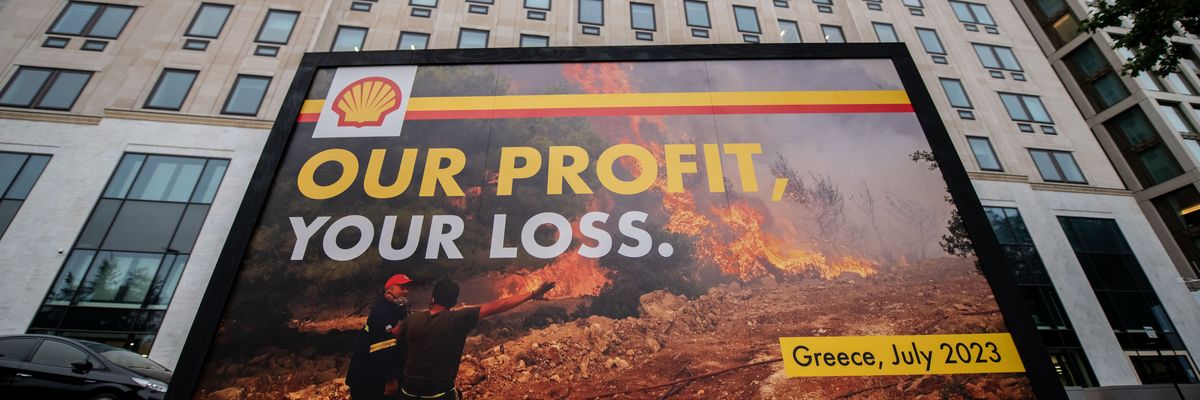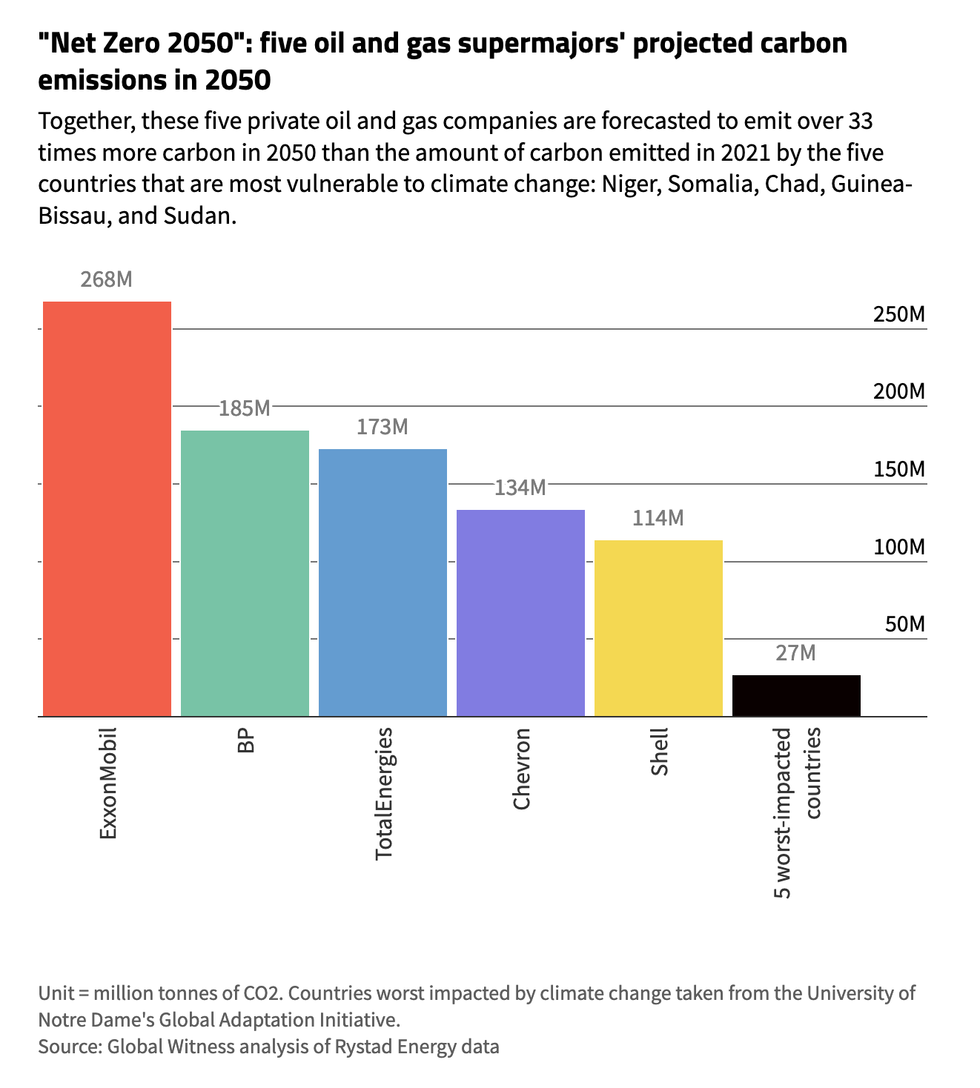
Greenpeace activists display a billboard during a protest outside Shell headquarters on July 27, 2023 in London.
Just Five Oil Giants Set to Blow an Eighth of the World's Carbon Budget by 2050: Analysis
"This puts the world on a dangerous trajectory of significantly overshooting climate targets."
Just five fossil fuel giants—BP, Shell, ExxonMobil, Chevron, and TotalEnergies—are set to use nearly an eighth of the world's dwindling carbon budget by 2050 as they continue to increase oil and gas production, driving up planet-warming emissions that are fueling catastrophic extreme weather worldwide.
According to an analysis released Tuesday by Global Witness, those five corporations are forecast to produce oil and gas that—when burned—will emit roughly 47 billion tonnes of carbon dioxide.
"This is equivalent to almost one-eighth of the remaining global carbon budget for staying below 1.5°C," the group noted, referring to the warming target set by the Paris climate accord.
Scientists have estimated that rich nations must completely cut off oil and gas production by 2034 to give the world a 50% chance of limiting warming to 1.5°C by the end of the century.
Citing data from the energy business intelligence agency Rystad, Global Witness noted that "in 2050 alone, these five major private western oil and gas companies are estimated to still produce oil and gas, which when burnt, equates to nearly 900 million tonnes of CO2."
"To balance out some of their emissions, many of these companies claim they will use methods designed to reduce emissions, such as carbon capture and storage technologies, according to Net Zero Tracker," the group added. "However, carbon capture and storage remains unproven at scale and highly controversial. This puts the world on a dangerous trajectory of significantly overshooting climate targets."
Global greenhouse gas emissions are currently at an all-time high as world leaders take little concrete action to rein in the primary source of those emissions—fossil fuels.
The new analysis by Global Witness comes as world leaders are preparing to convene for COP28 at the end of November, a summit that will follow months of devastating heatwaves, wildfires, flooding, and other fossil fuel-driven extreme weather across the planet.
"This analysis shows that the world’s top five private oil and gas companies, which already bear a huge responsibility for climate change, are not doing enough to cut emissions now or in the future," Global Witness said Tuesday. "Instead, they are on a dangerous path of foregoing drastic action now and continuing with climate-wrecking emissions."
In recent months, Shell and BP—both of which knew about the connection between fossil fuels and climate change long before they publicly acknowledged it—have walked back pledges to curb oil and gas production and weakened their emission-reduction goals.
Meanwhile, both companies have continued rewarding investors with dividend hikes and stock buybacks.
"It's time to bring in a permanent polluters' tax to hold BP and other fossil fuel companies to account for the damage they continue to wreak," Dorothy Guerrero, head of policy and advocacy at the U.K.-based group Global Justice Now, said earlier this month after BP reported $2.6 billion in second-quarter profits and announced another $1.5 billion in share buybacks.
"Leaving this industry with the power to profit without consequence is not only morally abhorrent—it's plainly ludicrous in the face of a climate catastrophe that threatens us all," Guerrero added.
An Urgent Message From Our Co-Founder
Dear Common Dreams reader, The U.S. is on a fast track to authoritarianism like nothing I've ever seen. Meanwhile, corporate news outlets are utterly capitulating to Trump, twisting their coverage to avoid drawing his ire while lining up to stuff cash in his pockets. That's why I believe that Common Dreams is doing the best and most consequential reporting that we've ever done. Our small but mighty team is a progressive reporting powerhouse, covering the news every day that the corporate media never will. Our mission has always been simple: To inform. To inspire. And to ignite change for the common good. Now here's the key piece that I want all our readers to understand: None of this would be possible without your financial support. That's not just some fundraising cliche. It's the absolute and literal truth. We don't accept corporate advertising and never will. We don't have a paywall because we don't think people should be blocked from critical news based on their ability to pay. Everything we do is funded by the donations of readers like you. Will you donate now to help power the nonprofit, independent reporting of Common Dreams? Thank you for being a vital member of our community. Together, we can keep independent journalism alive when it’s needed most. - Craig Brown, Co-founder |
Just five fossil fuel giants—BP, Shell, ExxonMobil, Chevron, and TotalEnergies—are set to use nearly an eighth of the world's dwindling carbon budget by 2050 as they continue to increase oil and gas production, driving up planet-warming emissions that are fueling catastrophic extreme weather worldwide.
According to an analysis released Tuesday by Global Witness, those five corporations are forecast to produce oil and gas that—when burned—will emit roughly 47 billion tonnes of carbon dioxide.
"This is equivalent to almost one-eighth of the remaining global carbon budget for staying below 1.5°C," the group noted, referring to the warming target set by the Paris climate accord.
Scientists have estimated that rich nations must completely cut off oil and gas production by 2034 to give the world a 50% chance of limiting warming to 1.5°C by the end of the century.
Citing data from the energy business intelligence agency Rystad, Global Witness noted that "in 2050 alone, these five major private western oil and gas companies are estimated to still produce oil and gas, which when burnt, equates to nearly 900 million tonnes of CO2."
"To balance out some of their emissions, many of these companies claim they will use methods designed to reduce emissions, such as carbon capture and storage technologies, according to Net Zero Tracker," the group added. "However, carbon capture and storage remains unproven at scale and highly controversial. This puts the world on a dangerous trajectory of significantly overshooting climate targets."
Global greenhouse gas emissions are currently at an all-time high as world leaders take little concrete action to rein in the primary source of those emissions—fossil fuels.
The new analysis by Global Witness comes as world leaders are preparing to convene for COP28 at the end of November, a summit that will follow months of devastating heatwaves, wildfires, flooding, and other fossil fuel-driven extreme weather across the planet.
"This analysis shows that the world’s top five private oil and gas companies, which already bear a huge responsibility for climate change, are not doing enough to cut emissions now or in the future," Global Witness said Tuesday. "Instead, they are on a dangerous path of foregoing drastic action now and continuing with climate-wrecking emissions."
In recent months, Shell and BP—both of which knew about the connection between fossil fuels and climate change long before they publicly acknowledged it—have walked back pledges to curb oil and gas production and weakened their emission-reduction goals.
Meanwhile, both companies have continued rewarding investors with dividend hikes and stock buybacks.
"It's time to bring in a permanent polluters' tax to hold BP and other fossil fuel companies to account for the damage they continue to wreak," Dorothy Guerrero, head of policy and advocacy at the U.K.-based group Global Justice Now, said earlier this month after BP reported $2.6 billion in second-quarter profits and announced another $1.5 billion in share buybacks.
"Leaving this industry with the power to profit without consequence is not only morally abhorrent—it's plainly ludicrous in the face of a climate catastrophe that threatens us all," Guerrero added.
- Oil and Gas Industry's Expansion Plans Decried as Attack on 'Livable Planet' ›
- Greenpeace Protests 'Shock Doctrine' by Blockading New TotalEnergies LNG Terminal ›
- 'Jaw-Dropping' Analysis Shows Fossil Fuel Companies to Burn Through 62% of Carbon Budget ›
- 'Bleak Reality': World on Track to Overshoot 1.5°C Target in at Least 1 of Next 5 Years | Common Dreams ›
- Shell Slammed for 'Planet-Wrecking' Profits as Temperatures Soar to New Heights | Common Dreams ›
Just five fossil fuel giants—BP, Shell, ExxonMobil, Chevron, and TotalEnergies—are set to use nearly an eighth of the world's dwindling carbon budget by 2050 as they continue to increase oil and gas production, driving up planet-warming emissions that are fueling catastrophic extreme weather worldwide.
According to an analysis released Tuesday by Global Witness, those five corporations are forecast to produce oil and gas that—when burned—will emit roughly 47 billion tonnes of carbon dioxide.
"This is equivalent to almost one-eighth of the remaining global carbon budget for staying below 1.5°C," the group noted, referring to the warming target set by the Paris climate accord.
Scientists have estimated that rich nations must completely cut off oil and gas production by 2034 to give the world a 50% chance of limiting warming to 1.5°C by the end of the century.
Citing data from the energy business intelligence agency Rystad, Global Witness noted that "in 2050 alone, these five major private western oil and gas companies are estimated to still produce oil and gas, which when burnt, equates to nearly 900 million tonnes of CO2."
"To balance out some of their emissions, many of these companies claim they will use methods designed to reduce emissions, such as carbon capture and storage technologies, according to Net Zero Tracker," the group added. "However, carbon capture and storage remains unproven at scale and highly controversial. This puts the world on a dangerous trajectory of significantly overshooting climate targets."
Global greenhouse gas emissions are currently at an all-time high as world leaders take little concrete action to rein in the primary source of those emissions—fossil fuels.
The new analysis by Global Witness comes as world leaders are preparing to convene for COP28 at the end of November, a summit that will follow months of devastating heatwaves, wildfires, flooding, and other fossil fuel-driven extreme weather across the planet.
"This analysis shows that the world’s top five private oil and gas companies, which already bear a huge responsibility for climate change, are not doing enough to cut emissions now or in the future," Global Witness said Tuesday. "Instead, they are on a dangerous path of foregoing drastic action now and continuing with climate-wrecking emissions."
In recent months, Shell and BP—both of which knew about the connection between fossil fuels and climate change long before they publicly acknowledged it—have walked back pledges to curb oil and gas production and weakened their emission-reduction goals.
Meanwhile, both companies have continued rewarding investors with dividend hikes and stock buybacks.
"It's time to bring in a permanent polluters' tax to hold BP and other fossil fuel companies to account for the damage they continue to wreak," Dorothy Guerrero, head of policy and advocacy at the U.K.-based group Global Justice Now, said earlier this month after BP reported $2.6 billion in second-quarter profits and announced another $1.5 billion in share buybacks.
"Leaving this industry with the power to profit without consequence is not only morally abhorrent—it's plainly ludicrous in the face of a climate catastrophe that threatens us all," Guerrero added.
- Oil and Gas Industry's Expansion Plans Decried as Attack on 'Livable Planet' ›
- Greenpeace Protests 'Shock Doctrine' by Blockading New TotalEnergies LNG Terminal ›
- 'Jaw-Dropping' Analysis Shows Fossil Fuel Companies to Burn Through 62% of Carbon Budget ›
- 'Bleak Reality': World on Track to Overshoot 1.5°C Target in at Least 1 of Next 5 Years | Common Dreams ›
- Shell Slammed for 'Planet-Wrecking' Profits as Temperatures Soar to New Heights | Common Dreams ›


